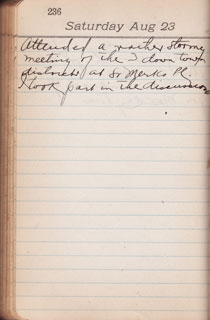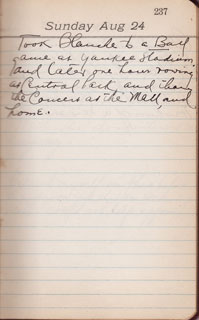
Got a card from Clara from
Spring Valley. I am indifferent to her.
————–
Matt’s Notes
As we know, the Clara mentioned above is not Papa’s sister Clara, but probably one of the cousins he stayed with when he first came to America in 1913. Clara II, as I shall hereafter refer to her for clarity’s sake, became an object of affection for Papa at some point in the intervening years, but their relationship has gotten stuck, engines revving and wheels spinning fruitlessly, at the relationship of friendship and intimacy.
Papa knows Clara II well and therefore hasn’t formally introduced her to us, but it looks like their orbital behavior is well-established: Clara II leads Papa on in order to get attention or favors from him, and Papa, frustrated, vows to wash his hands of her and resist her “trickery” only to answer when she again comes calling. We can almost see it unfold in his reaction to her postcard, which he writes about in his diary but only in order to deny his excitement over hearing from her. I suppose anyone who has ever been unable to exit a relationship that was clearly going nowhere knows the feeling.
————
Additional Notes
Spring Valley was likely the site of a Jewish summer colony where Clara II went to get away from the city (women generally went to such colonies for extended stays, while the men in their families stayed in the city to work and joined them on weekends). As reader Marisa notes on this site’s “Cry for Help” page:
spring valley, new york is part of suburban rockland county which is 30 minutes northwest of new york city. currently spring valley and its neighboring town monsey are home to one of the country’s largest concentration of orthodox jews. (the rest of rockland county is also densely populated with jews of all denominations)probably in the 1920’s it was more rural and used as a summertime retreat for urban dwellers such as papa and other LES jews. since people began to move out of the city and populate suburbs such as rockland and westchester counties in the 1940’s and 1950’s, people began moving further north for such summertime family retreats. for example the catskill mountain region.









